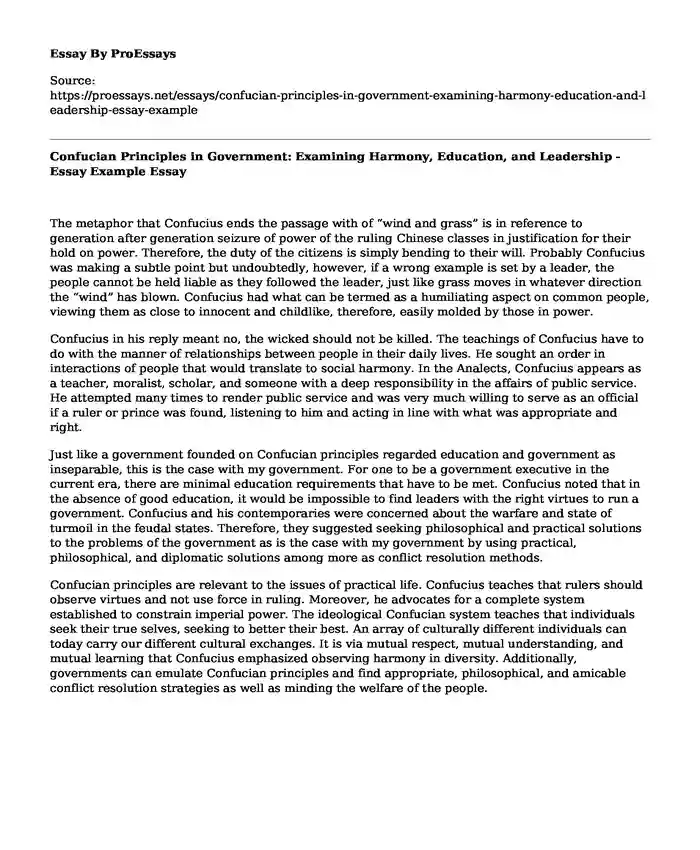The metaphor that Confucius ends the passage with of “wind and grass” is in reference to generation after generation seizure of power of the ruling Chinese classes in justification for their hold on power. Therefore, the duty of the citizens is simply bending to their will. Probably Confucius was making a subtle point but undoubtedly, however, if a wrong example is set by a leader, the people cannot be held liable as they followed the leader, just like grass moves in whatever direction the “wind” has blown. Confucius had what can be termed as a humiliating aspect on common people, viewing them as close to innocent and childlike, therefore, easily molded by those in power.
Confucius in his reply meant no, the wicked should not be killed. The teachings of Confucius have to do with the manner of relationships between people in their daily lives. He sought an order in interactions of people that would translate to social harmony. In the Analects, Confucius appears as a teacher, moralist, scholar, and someone with a deep responsibility in the affairs of public service. He attempted many times to render public service and was very much willing to serve as an official if a ruler or prince was found, listening to him and acting in line with what was appropriate and right.
Just like a government founded on Confucian principles regarded education and government as inseparable, this is the case with my government. For one to be a government executive in the current era, there are minimal education requirements that have to be met. Confucius noted that in the absence of good education, it would be impossible to find leaders with the right virtues to run a government. Confucius and his contemporaries were concerned about the warfare and state of turmoil in the feudal states. Therefore, they suggested seeking philosophical and practical solutions to the problems of the government as is the case with my government by using practical, philosophical, and diplomatic solutions among more as conflict resolution methods.
Confucian principles are relevant to the issues of practical life. Confucius teaches that rulers should observe virtues and not use force in ruling. Moreover, he advocates for a complete system established to constrain imperial power. The ideological Confucian system teaches that individuals seek their true selves, seeking to better their best. An array of culturally different individuals can today carry our different cultural exchanges. It is via mutual respect, mutual understanding, and mutual learning that Confucius emphasized observing harmony in diversity. Additionally, governments can emulate Confucian principles and find appropriate, philosophical, and amicable conflict resolution strategies as well as minding the welfare of the people.
Cite this page
Confucian Principles in Government: Examining Harmony, Education, and Leadership - Essay Example. (2023, Dec 29). Retrieved from https://proessays.net/essays/confucian-principles-in-government-examining-harmony-education-and-leadership-essay-example
If you are the original author of this essay and no longer wish to have it published on the ProEssays website, please click below to request its removal:
- Essay on Divergent and Convergent Thinking
- Essay on 14th Amendment and Key Court Decisions From 1870-1930
- Essay Sample on Scaffolding in the Early Childhood Classroom
- Argumentative Essay: A Leader Is Best Judged by the Well-Being of the People in His Country
- U.S. Drug Control Policy: Slowly Learning the Hard Way & Its Implications for Mexico - Annotated Bibliography
- Essay Example on Hinduism: World's Oldest Religion, Free From Fanaticism
- Grandma's Delicious Recipes: My Baking Journey with My Grandmother - Paper Sample







